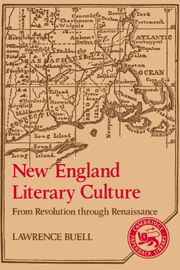Book contents
- Frontmatter
- Contents
- Acknowledgments
- Abbreviations of Frequently Cited Works
- PART I FOUR OVERVIEWS
- PART II THREE REPRESENTATIVE GENRES
- PART III REINVENTING PURITANISM: THE NEW ENGLAND HISTORICAL IMAGINATION
- Part IV NEW ENGLAND AS A COUNTRY OF THE IMAGINATION: THE SPIRIT OF PLACE
- 12 The Cultural Landscape in Regional Poetry and Prose
- 13 The Village as Icon
- 14 Lococentrism from Dwight to Thoreau
- 15 Comic Grotesque
- 16 Provincial Gothic: Hawthorne, Stoddard, and Others
- Postscript
- Appendix Vital Statistics: A Quantitative Analysis of Authorship as a Profession in New England
- Notes
- Index
12 - The Cultural Landscape in Regional Poetry and Prose
Published online by Cambridge University Press: 15 October 2009
- Frontmatter
- Contents
- Acknowledgments
- Abbreviations of Frequently Cited Works
- PART I FOUR OVERVIEWS
- PART II THREE REPRESENTATIVE GENRES
- PART III REINVENTING PURITANISM: THE NEW ENGLAND HISTORICAL IMAGINATION
- Part IV NEW ENGLAND AS A COUNTRY OF THE IMAGINATION: THE SPIRIT OF PLACE
- 12 The Cultural Landscape in Regional Poetry and Prose
- 13 The Village as Icon
- 14 Lococentrism from Dwight to Thoreau
- 15 Comic Grotesque
- 16 Provincial Gothic: Hawthorne, Stoddard, and Others
- Postscript
- Appendix Vital Statistics: A Quantitative Analysis of Authorship as a Profession in New England
- Notes
- Index
Summary
I call it rich without compunction, despite its several poverties. … When you wander about in Arcadia you ask as few questions as possible.
Henry James, The American Scene (1907)Here, in these shades, these deep seclusions hid
Beneath the whisp'ring leaves and o'er our moors
A ragged independence lives at ease,
Wearing those good adornments of the race,
Such as pure air, warm suns, and builds the Hero
Urban pens describe.
Ellery Channing, Near Home (1858)The literary reinvention of Puritanism was only part of the more far-eaching project of articulating all of New England culture and its institutions in literary form. This larger project preceded and outlasted the vogue of historical writing, at its height between 1820 and 1850. This chapter and the next four will examine some characteristic ways in which New England writing codified the regional sense of place.
Here, as before, the Revolutionary era supplies a somewhat arbitrary yet justifiable starting point. It is arbitrary in the sense that the New England landscape and ethos had already been mapped in some detail by early explorers, by Puritan historians, and by diarists and travelers like Samuel Sewall and Sarah Kemble Knight. It is justifiable, however, in that post-Revolutionary literary nationalist aesthetics tended temporarily to suppress and erase old-style colonial attachments and to create at least the illusion that any future regionalism would have to build itself anew.
- Type
- Chapter
- Information
- New England Literary CultureFrom Revolution through Renaissance, pp. 283 - 303Publisher: Cambridge University PressPrint publication year: 1986
- 1
- Cited by



